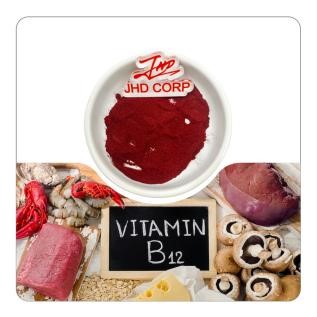Welcome to JHD Nutrasource!
Shop
Methylcobalamin
Methylcobalamin is an active form of vitamin B12. It is a water – soluble vitamin that occurs naturally in certain foods and can also be synthesized through bacterial fermentation. Unlike other forms of vitamin B12, such as cyanocobalamin, methylcobalamin does not require additional conversion in the body, allowing for faster absorption and utilization.
Description
| Product Name | Methylcobalamin |
| Appearance | white to off-white crystalline powder |
| Specification | ≥98% |
| Test Method | HPLC |
| Source | through a chemical process |
| Certificate | USP/EP/JP/Kosher/Halal/GMP |
| CAS No | 14972-37-2 |
| MF No | C₆₃H₈₉CoN₁₄O₁₄P |
Functions
- Methylation Reactions: It serves as a cofactor in biochemical reactions, facilitating the transfer of methyl groups ( – CH3), which is involved in DNA synthesis, repair, and gene regulation, thereby being crucial for overall cellular health.
- Homocysteine Metabolism: Methylcobalamin plays a vital role in converting homocysteine, an amino acid, into methionine. Elevated homocysteine levels are associated with an increased risk of cardiovascular diseases, and by reducing homocysteine levels, it helps protect against heart disease and stroke.
- Nerve Health and Regeneration: It is essential for maintaining the health of nerve cells. It helps repair damaged nerves, promotes the synthesis and regeneration of myelin, improves nerve conduction velocity, and inhibits ectopic spontaneous discharge, thus being beneficial in neuropathic conditions.
- Energy Production: Methylcobalamin is involved in the metabolism of fats and carbohydrates. It aids in the production of cellular energy within mitochondria, reducing fatigue and promoting vitality.
- Cognitive Function: Adequate levels of methylcobalamin are associated with better cognitive function and mental clarity. It may improve memory, focus, and overall brain health, and deficiency can lead to memory issues and cognitive decline.
- Red Blood Cell Formation: It is necessary for the production of red blood cells. Vitamin B12, in the form of methylcobalamin, helps ensure the proper development and maturation of red blood cells, preventing megaloblastic anemia.
Applications
- Medical Field: It is mainly used to treat vitamin B12 deficiency – related conditions2. This includes pernicious anemia, diabetic neuropathy, and other nerve problems such as neuropathy, neuralgia, back pain, and neck pain caused by nerve damage or vitamin B12 deficiency. It is also used to improve cognitive function in cases of cognitive decline related to vitamin B12 deficiency. In addition, methylcobalamin shows potential analgesic effects and is used to relieve various pains, including diabetic neuropathic pain, low back pain, neck pain, subacute herpetic neuralgia, glossopharyngeal neuralgia, and trigeminal neuralgia.
- Dietary Supplements: It is often added to dietary supplements, especially for people with poor dietary intake of vitamin B12, such as vegetarians and vegans, or those with malabsorption issues. Supplementing with methylcobalamin can help maintain normal vitamin B12 levels in the body and support overall health.

